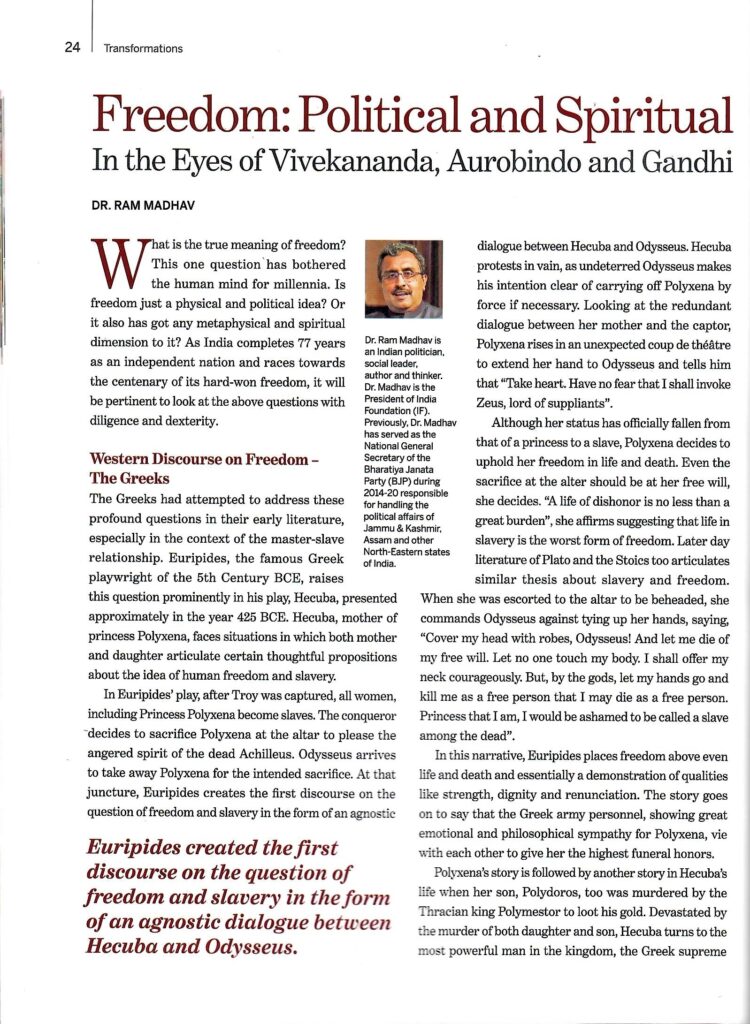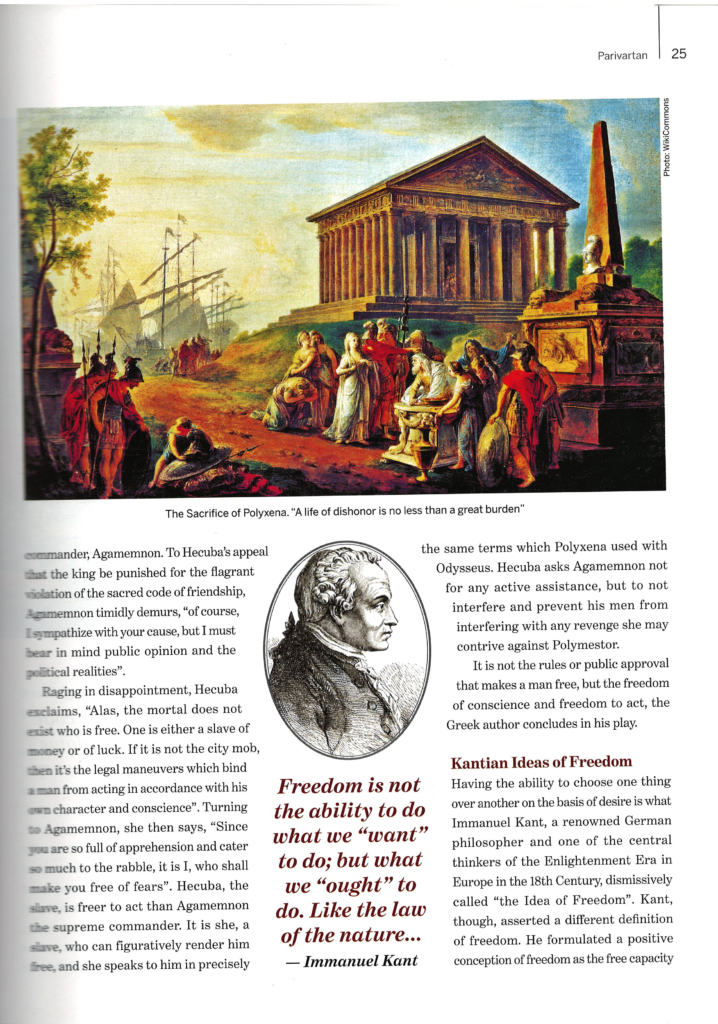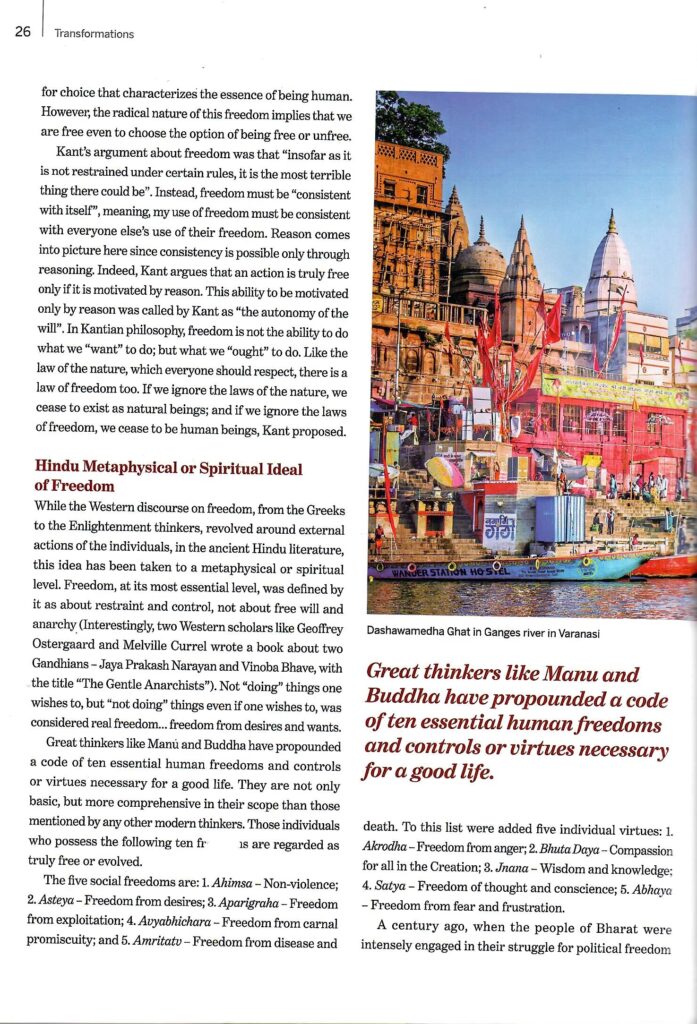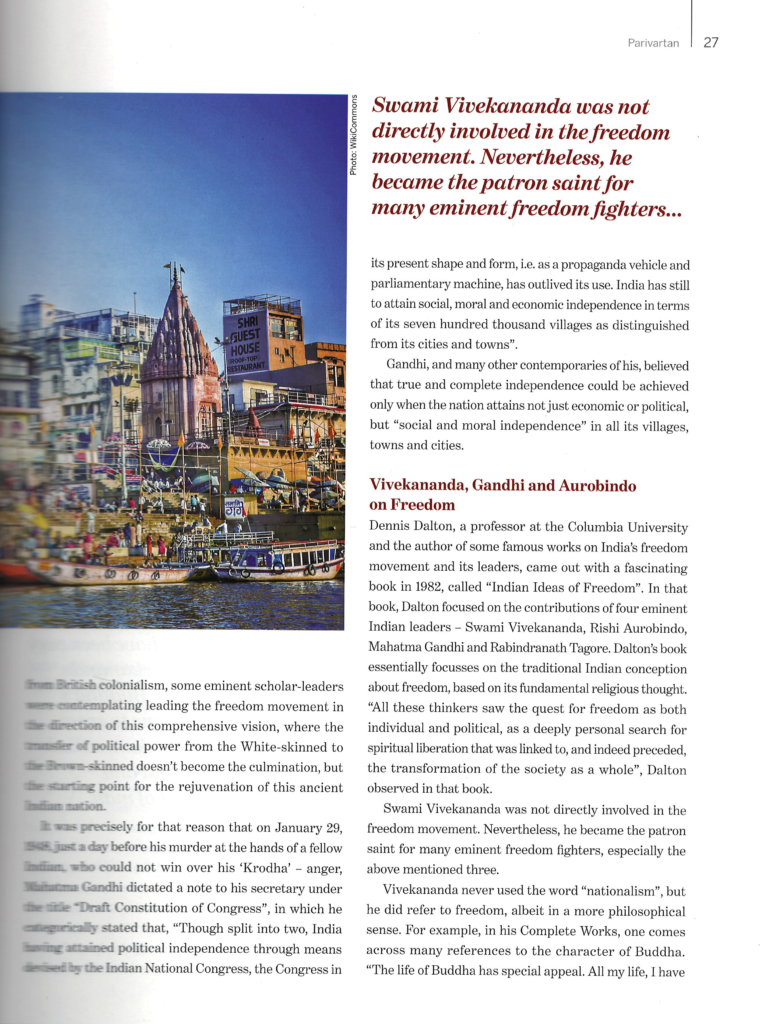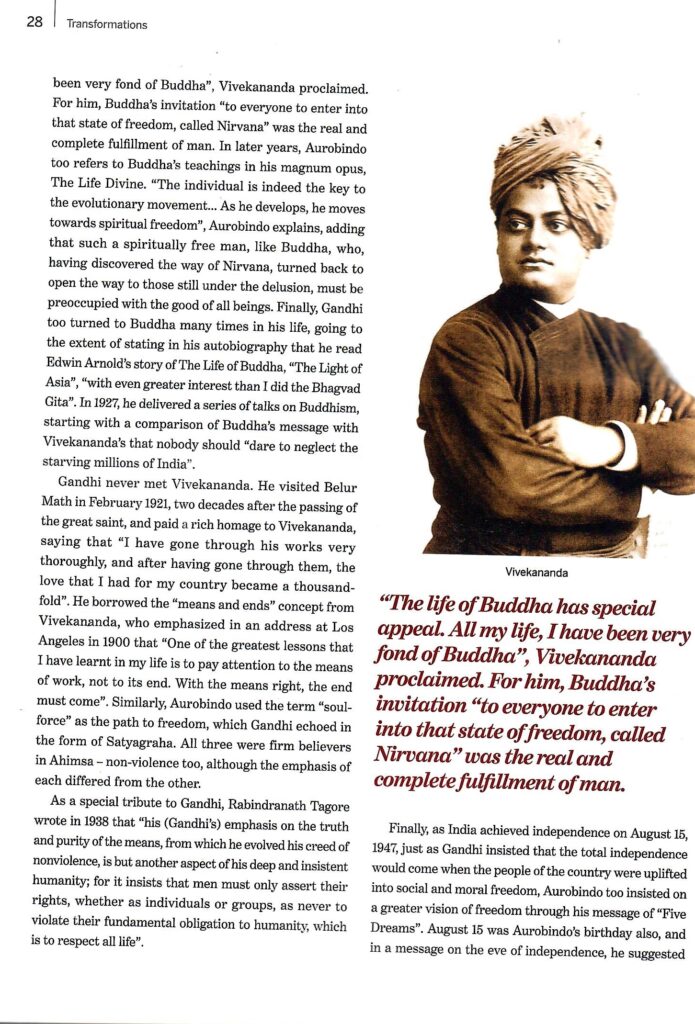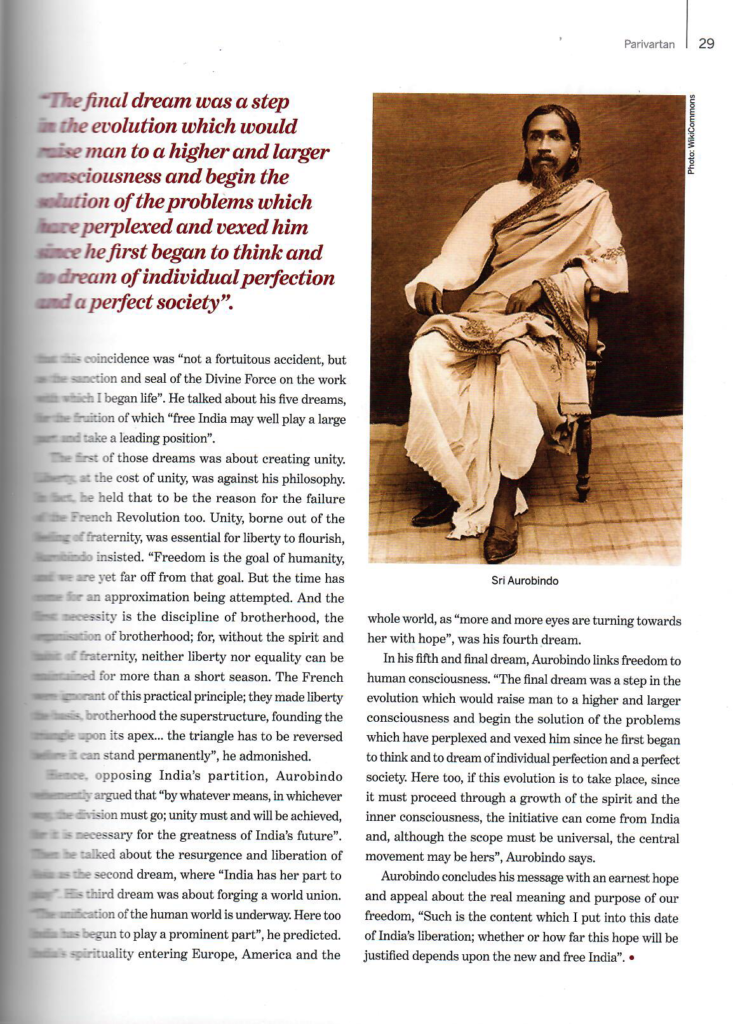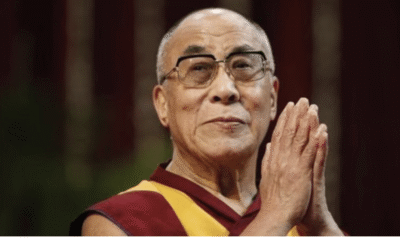
|
Getting your Trinity Audio player ready...
|
(The article was originally published in April 2024 issue of Transformations Parivartan – An India Habitat Centre Publication)
What is the true meaning of freedom? This one question has bothered the human mind for millennia. Is freedom just a physical and political idea? Or it also has got any metaphysical and spiritual dimension to it? As India completes 77 years as an independent nation and races towards the centenary of its hard-won freedom, it will be pertinent to look at the above questions with diligence and dexterity.
Western Discourse on Freedom – The Greeks:
The Greeks had attempted to address these profound questions in their early literature, especially in the context of the master-slave relationship. Euripides, the famous Greek playwright of the 5th Century BCE, raises this question prominently in his play, Hecuba, presented approximately in the year 425 BCE. Hecuba, mother of princess Polyxena, faces situations in which both mother and daughter articulate certain thoughtful propositions about the idea of human freedom and slavery.
In Euripides’ play, after Troy was captured, all women, including Princess Polyxena become slaves. The conqueror decides to sacrifice Polyxena at the altar to please the angered spirit of the dead Achilleus. Odysseus arrives to take away Polyxena for the intended sacrifice. At that juncture, Euripides creates the first discourse on the question of freedom and slavery in the form of an agnostic dialogue between Hecuba and Odysseus. Hecuba protests in vain, as undeterred Odysseus makes his intention clear of carrying off Polyxena by force if necessary. Looking at the redundant dialogue between her mother and the captor, Polyxena rises in an unexpected coup de théâtre to extend her hand to Odysseus and tells him that “Take heart. Have no fear that I shall invoke Zeus, lord of suppliants”.
Although her status has officially fallen from that of a princess to a slave, Polyxena decides to uphold her freedom in life and death. Even the sacrifice at the alter should be at her free will, she decides. “A life of dishonor is no less than a great burden”, she affirms suggesting that life in slavery is the worst form of freedom. Later day literature of Plato and the Stoics too articulates similar thesis about slavery and freedom. When she was escorted to the altar to be beheaded, she commands Odysseus against tying up her hands, saying, “Cover my head with robes, Odysseus! And let me die of my free will. Let no one touch my body. I shall offer my neck courageously. But, by the gods, let my hands go and kill me as a free person that I may die as a free person. Princess that I am, I would be ashamed to be called a slave among the dead”.
In this narrative, Euripides places freedom above even life and death and essentially a demonstration of qualities like strength, dignity and renunciation. The story goes on to say that the Greek army personnel, showing great emotional and philosophical sympathy for Polyxena, vie with each other to give her the highest funeral honors.
Polyxena’s story is followed by another story in Hecuba’s life when her son, Polydoros, too was murdered by the Thracian king Polymestor to loot his gold. Devastated by the murder of both daughter and son, Hecuba turns to the most powerful man in the kingdom, the Greek supreme commander Agamemnon. To Hecuba’s appeal that the king be punished for the flagrant violation of the sacred code of friendship, Agamemnon timidly demurs, “of course, I sympathize with your cause, but I must bear in mind public opinion and the political realities”.
Raging in disappointment, Hecuba exclaims, “Alas, the mortal does not exist who is free. One is either a slave of money or of luck. If it is not the city mob, then it’s the legal maneuvers which bind a man from acting in accordance with his own character and conscience”. Turning to Agamemnon, she then says, “Since you are so full of apprehension and cater so much to the rabble, it is I, who shall make you free of fears”. Hecuba, the slave is freer to act than Agamemnon the supreme commander. It is she, a slave, who can figuratively render him free, and she speaks to him in precisely the same terms which Polyxena used with Odysseus. Hecuba asks Agamemnon not for any active assistance, but to not interfere and prevent his men from interfering with any revenge she may contrive against Polymestor.
It is not the rules or public approval that make a man free, but the freedom of conscience and freedom to act, the Greek author concludes in his play.
Kantian Ideas of Freedom:
Having the ability to choose one thing over another on the basis of desire is what Immanuel Kant, a renowned German philosopher and one of the central thinkers of the Enlightenment Era in Europe in the 18th Century, dismissively called “the Idea of Freedom”. Kant, though, asserted a different definition of freedom. He formulated a positive conception of freedom as the free capacity for choice that characterizes the essence of being human. However, the radical nature of this freedom implies that we are free even to choose the option of being free or unfree.
Kant’s argument about freedom was that “insofar as it is not restrained under certain rules, it is the most terrible thing there could be.” Instead, freedom must be “consistent with itself”, meaning, my use of freedom must be consistent with everyone else’s use of their freedom. Reason comes into picture here since consistency is possible only through reasoning. Indeed, Kant argues that an action is truly free only if it is motivated by reason. This ability to be motivated only by reason was called by Kant as “the autonomy of the will”. In Kantian philosophy, freedom is not the ability to do what we “want” to do; but what we “ought” to do. Like the law of the nature, which everyone should respect, there is a law of freedom too. If we ignore the laws of the nature, we cease to exist as natural beings; and if we ignore the laws of freedom, we cease to be human beings, Kant proposed.
Hindu Metaphysical or Spiritual Ideal of Freedom:
While the Western discourse on freedom, from the Greeks to the Enlightenment thinkers, revolved around external actions of the individuals, in the ancient Hindu literature, this idea has been taken to a metaphysical or spiritual level. Freedom, at its most essential level, was defined by it as about restraint and control, not about free will and anarchy (Interestingly, two Western scholars like Geoffrey Ostergaard and Melville Currel wrote a book about two Gandhians – Jaya Prakash Narayan and Vinoba Bhave, with the title “The Gentle Anarchists”). Not “doing” things one wishes to, but “not doing” things even if one wishes to, was considered real freedom… freedom from desires and wants.
Great thinkers like Manu and Buddha have propounded a code of ten essential human freedoms and controls or virtues necessary for a good life. They are not only basic, but more comprehensive in their scope than those mentioned by any other modern thinkers. Those individuals who possess the following ten freedoms are regarded as truly free or evolved.
The five social freedoms are: 1. Ahimsa – Non-violence; 2. Asteya – Freedom from desires; 3. Aparigraha – Freedom from exploitation; 4. Avyabhichara – Freedom from carnal promiscuity; and 5. Amritatv – Freedom from disease and death. To this list were added five individual virtues: 1. Akrodha – Freedom from anger; 2. Bhuta Daya – Compassion for all in the Creation; 3. Jnana – Wisdom and knowledge; 4. Satya – Freedom of thought and conscience; 5. Abhaya – Freedom from fear and frustration.
A century ago, when the people of Bharat were intensely engaged in their struggle for political freedom from British colonialism, some eminent scholar-leaders were contemplating leading the freedom movement in the direction of this comprehensive vision, where the transfer of political power from the White-skinned to the Brown-skinned doesn’t become the culmination, but the starting point for the rejuvenation of this ancient Indian nation.
It was precisely for that reason that on January 29, 1948, just a day before his murder at the hands of a fellow Indian, who couldn’t win over his Krodha – anger, Mahatma Gandhi dictated a note to his secretary under the title “Draft Constitution of Congress”, in which he categorically stated that, “Though split into two, India having attained political independence through means devised by the Indian National Congress, the Congress in its present shape and form, i.e. as a propaganda vehicle and parliamentary machine, has outlived its use. India has still to attain social, moral and economic independence in terms of its seven hundred thousand villages as distinguished from its cities and towns”.
Gandhi, and many other contemporaries of his, believed that true and complete independence could be achieved only when the nation attains not just economic or political, but “social and moral independence” in all its villages, towns and cities.
Vivekananda, Gandhi and Aurobindo on Freedom:
Dennis Dalton, a professor at the Columbia University and the author of some famous works on India’s freedom movement and its leaders, came out with a fascinating book in 1982, called “Indian Ideas of Freedom”. In that book, Dalton focused on the contributions of four eminent Indian leaders – Swami Vivekananda, Rishi Aurobindo, Mahatma Gandhi and Rabindranath Tagore. Dalton’s book essentially focusses on the traditional Indian conception about freedom, based on its fundamental religious thought. “All these thinkers saw the quest for freedom as both individual and political, as a deeply personal search for spiritual liberation that was linked to, and indeed preceded, the transformation of the society as a whole”, Dalton observed in that book.
Swami Vivekananda was not directly involved in the freedom movement. Nevertheless, he became the patron saint for many eminent freedom fighters, especially the above mentioned three.
Vivekananda never used the word “nationalism”, but he did refer to freedom, albeit in a more philosophical sense. For example, in his Complete Works, one comes across many references to the character of Buddha. “The life of Buddha has special appeal. All my life, I have been very fond of Buddha”, Vivekananda proclaimed. For him, Buddha’s invitation “to everyone to enter into that state of freedom, called Nirvana” was the real and complete fulfillment of man. In later years, Aurobindo too refers to Buddha’s teachings in his magnum opus, The Life Divine. “The individual is indeed the key to the evolutionary movement… As he develops, he moves towards spiritual freedom”, Aurobindo explains, adding that such a spiritually free man, like Buddha, who, having discovered the way of Nirvana, turned back to open the way to those still under the delusion, must be preoccupied with the good of all beings. Finally, Gandhi too turned to Buddha many times in his life, going to the extent of stating in his autobiography that he read Edwin Arnold’s story of The Life of Buddha, “The Light of Asia”, “with even greater interest than I did the Bhagvad Gita”. In 1927, he delivered a series of talks on Buddhism, starting with a comparison of Buddha’s message with Vivekananda’s that nobody should “dare to neglect the starving millions of India”.
Gandhi never met Vivekananda. He visited Belur Math in February 1921, two decades after the passing of the great saint, and paid a rich homage to Vivekananda, saying that “I have gone through his works very thoroughly, and after having gone through them, the love that I had for my country became a thousand-fold”. He borrowed the “means and ends” concept from Vivekananda, who emphasized in an address at Los Angeles in 1900 that “One of the greatest lessons that I have learnt in my life is to pay attention to the means of work, not to its end. With the means right, the end must come”. Similarly, Aurobindo used the term “soul-force” as the path to freedom, which Gandhi echoed in the form of Satyagraha. All three were firm believers in Ahimsa – non-violence too, although the emphasis of each differed from the other.
As a special tribute to Gandhi, Rabindranath Tagore wrote in 1938 that “his (Gandhi’s) emphasis on the truth and purity of the means, from which he evolved his creed of nonviolence, is but another aspect of his deep and insistent humanity; for it insists that men must only assert their rights, whether as individuals or groups, as never to violate their fundamental obligation to humanity, which is to respect all life”.
Finally, as India achieved independence on August 15, 1947, just as Gandhi insisted that the total independence would come when the people of the country were uplifted into social and moral freedom, Aurobindo too insisted on a greater vision of freedom through his message of “Five Dreams”. August 15 was Aurobindo’s birthday also, and in a message on the eve of independence, he suggested that this coincidence was “not a fortuitous accident, but as the sanction and seal of the Divine Force on the work with which I began life”. He talked about his five dreams, for the fruition of which “free India may well play a large part and take a leading position”.
The first of those dreams was about creating unity. Liberty, at the cost of unity, was against his philosophy. In fact, he held that to be the reason for the failure of the French Revolution too. Unity, borne out of the feeling of fraternity, was essential for liberty to flourish, Aurobindo insisted. “Freedom is the goal of humanity, and we are yet far off from that goal. But the time has come for an approximation being attempted. And the first necessity is the discipline of brotherhood, the organisation of brotherhood; for, without the spirit and habit of fraternity, neither liberty nor equality can be maintained for more than a short season. The French were ignorant of this practical principle; they made liberty the basis, brotherhood the superstructure, founding the triangle upon its apex… the triangle has to be reversed before it can stand permanently”, he admonished.
Hence, opposing India’s partition, Aurobindo vehemently argued that “by whatever means, in whichever way, the division must go; unity must and will be achieved, for it is necessary for the greatness of India’s future”. Then he talked about the resurgence and liberation of Asia as the second dream, where “India has her part to play”. His third dream was about forging a world union. “The unification of the human world is underway. Here too India has begun to play a prominent part”, he predicted. India’s spirituality entering Europe, America and the whole world, as “more and more eyes are turning towards her with hope”, was his fourth dream.
In his fifth and final dream, Aurobindo links freedom to human consciousness. “The final dream was a step in the evolution which would raise man to a higher and larger consciousness and begin the solution of the problems which have perplexed and vexed him since he first began to think and to dream of individual perfection and a perfect society. Here too, if this evolution is to take place, since it must proceed through a growth of the spirit and the inner consciousness, the initiative can come from India and, although the scope must be universal, the central movement may be hers”, Aurobindo says.
Aurobindo concludes his message with an earnest hope and appeal about the real meaning and purpose of our freedom, “Such is the content which I put into this date of India’s liberation; whether or how far this hope will be justified depends upon the new and free India”.


